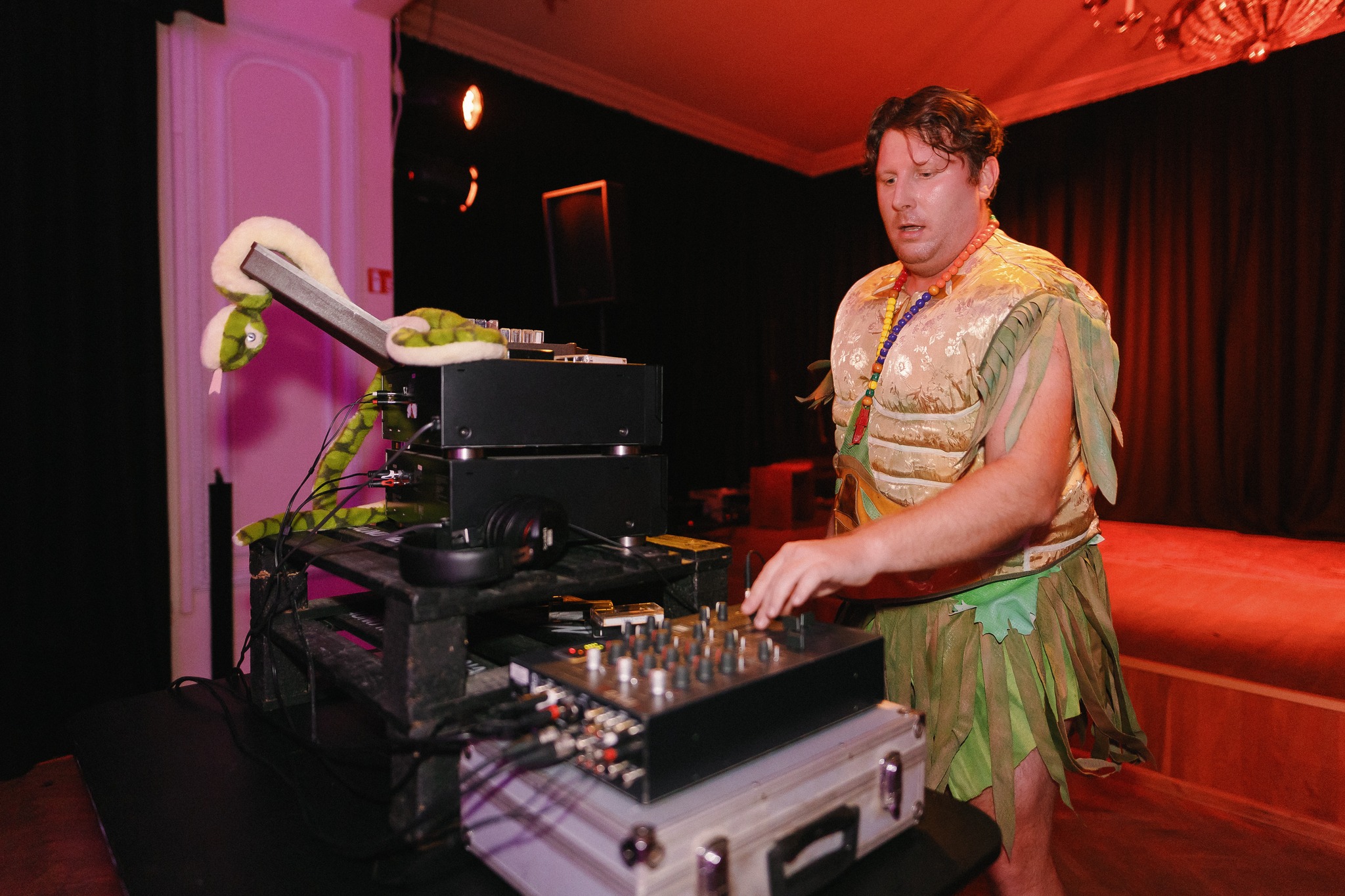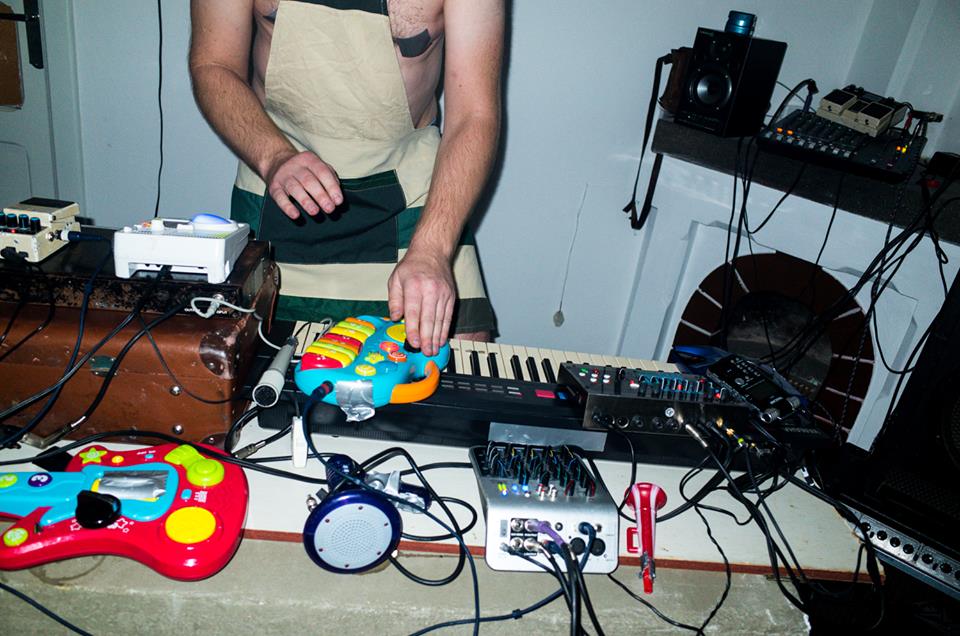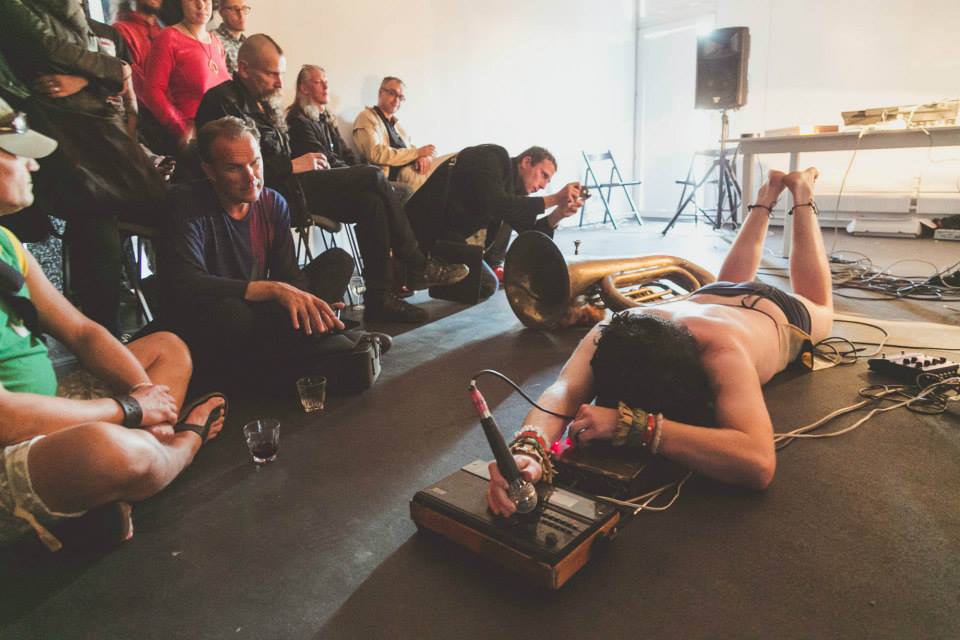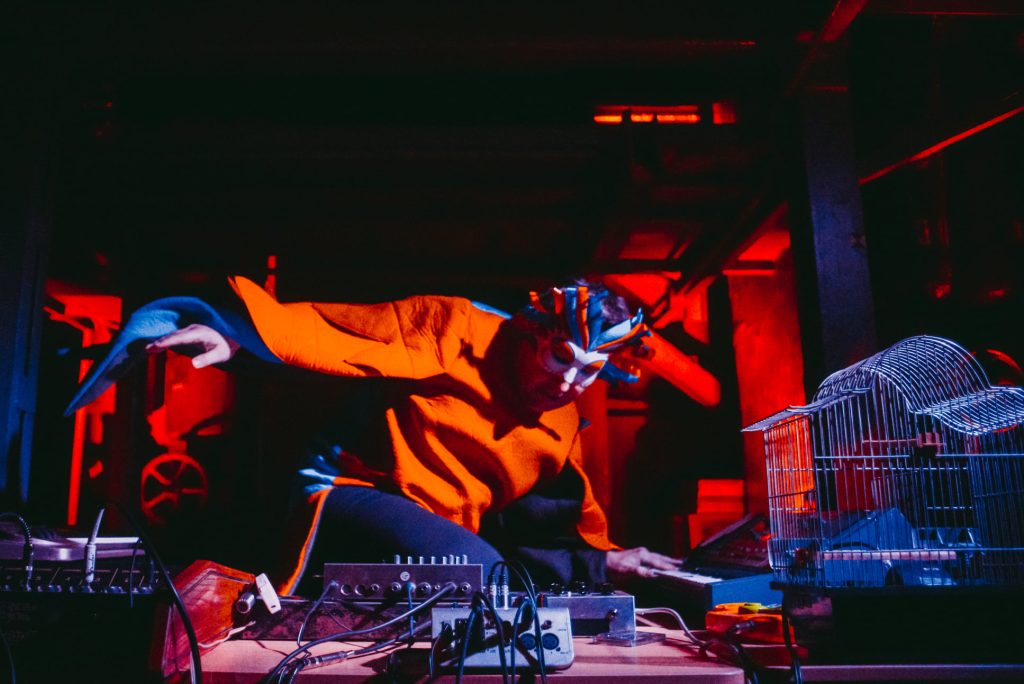Sonic Adventures in Search of the Source — an Interview with Arma Agharta
Published April, 2025
by Paulius Ilevičius

Armantas Gečiauskas, aka Arma Agharta, can now be regarded as a person without whom the Lithuanian experimental scene wouldn’t be as rich as it is. Arma carved his own small, crazy, unpredictable and always-exciting universe with his array of activities, which include performing, label curation, event organising and frequent globe-trotting tours spanning across all continents. In all his activities Arma has never succumbed to genre confines or snobbism. Despite his noise/non-music background, Arma’s events and his present label Tapekiosk provide home for artists as diverse as darkwave/trap auteur Šalna, hauntological plunderphonics maverick Gimė-mirė, good old-school punk outfit Masė or icy new age of Arturas Bumsteinas. However, there is always a coherence in quality and uniqueness both in Arma’s and his label’s output.
Arma’s performances have alway been a surprise and you never know which character he will become, what strange devices he will use and which strange sounds will attack you. I’ve seen Arma in places as diverse as Sameheads, a hip bar/club in Neukölln, Berlin, in a brutalist Kablys club in Vilnius or in pretty random places where you wouldn’t expect such performance to take place, and in every situation he always managed to connect to the public and maintain this connection throughout the show. The performances were always playful, adventurous in the sense of a sonic curiosity shop and full of genuine passion. And, of course, it is impossible to see Arma doing the same thing twice.
His tape DJ sets as Groja Magas are also a strange fusion of DJ art and dadaism that could turn an art space into a crazy obscure Eurodisco party in seconds. They are an exciting continuation of his performances, an innovative take on DJ culture that often takes itself too seriously.
It’s quite difficult to describe all Arma’s projects in a few paragraphs, so let the man himself do the talking and your years do the listening. Happy reading and exploring and make sure to catch Arma performing live and definitely grab some of his releases that usually won’t stay in stock for too long!
After being all those years in the underground circles, where do you feel you are now? Have you reached a certain balance or are you still in a transition/evolution?
The answer where I am relates to the answer to the question of who I am. My self-identification has been constantly changing in recent years and, even though I still do performances from time to time, I probably no longer feel part of a certain specific scene. While in the past I could call myself “international touring artist,” now I am more like an “occasionally performing artist.”
Performing is no longer my main activity, so creative evolution also came to a halt since the beginning of the Covid period. I remember that already in 2019 I was already tired from concerts and planned to take a break in 2020, so, thanks to the virus, I had way less gigs since then and started to focus on tape collecting, selling and publishing. However, in 2023 and 2024 I emerged with my extended cassette selector alter-ego Groja Magas. Even though I don’t play my own music and don’t play fully live, it brings lots of joy to me and, I hope, for others too.
Have I reached the balance? Probably not. I think I would have the balance if I continued to create and perform. But I know that my life becomes dull when I abandon these activities, so I think something will come out in the future.

Tapekiosk is a tape-only label, and you are an avid fan, collector, and promoter of the cassette format. Where does this long-time fascination with the format come from? Have you ever been tempted to do CDs or vinyls?
Probably, as for most people of my generation, I started listening to tapes in my teenage years, as it was the most accessible format. The process of recording the music from the radio by using cheap decks and then speaking some nonsense on top of the recording was something magical, these were the first sonic experiments. I was so obsessed with tapes that I even remember stealing sealed BASF tapes from a supermarket, which I then used for home recording (laughs).
Ironically, my first labels and cassette publishing activities started with the end of the tape era. From 2003/2004, I started such labels as Perineum (formerly known as Darsonvalis Perineum), Red Brick Chimney, Agharta Tapes, and, finally, Tapekiosk. Of course, there was a period when I mostly released CDs (I couldn’t afford the proper CDs). I’ve never had any fascination with vinyl and will probably never have. I remember throwing away a few potato bags of vinyls and giving away lots of them to my friends. So, my collections consist of hundreds of tapes and CDs.
Your live performances and super lively and entertaining DJ sets for me were always like unexpected happenings, bursts of (un)controlled chaos and playfulness, where you don’t know what happens next and are always pleasantly surprised. It reminds me of dadaism or certain 70s countercultural actions with a Lithuanian flavour. Where do you source your energy and inspirations for your live performances? Do you plan then, or does it all happen spontaneously here and now?
I source my energy and inspirations from The Source :)) I find it in imagination, in the otherworldliness, in love, in joy, in sound itself, in absurdity, in power, in wisdom… Man, the most important thing is to connect with the Source when performing. If I manage to establish this connection, contact, I feel that the performance was a success. I prepare for my performances by building a certain framework that includes clear parts of the structure (usually around 4-5 parts) and transitions in between. All the rest is left for improvisation, and there is a lot of it.

For me, you were always occupying your niche even within the underground/experimental arts establishment. You never succumbed to elitism, snobbism, and overt pretentiousness, and it seems that everything you do flows very organically and honestly straight from your heart. How do you achieve this? And do you feel we have enough of such honesty in our underground scene?
I have my period of arrogance, although it may not have been that visible. There was a period when I was comparing myself with other performers and wanted to be better than others. But I recognised it within me, and I think I overcame it. We face all types of bullshit all around us and it is up to every person how they deal with that, but it is important to recognise where it comes from. In my case, it was a teenage desire to compete with others. I don’t want to do this anymore. I just want us all to enjoy the sounds that bring us to other spaces where really interesting things happen (most of the time :)). And I want to believe that most performers come to the stage with open hearts, whatever they are – pure or broken. I just want to feel that genuine emotion, and identify when there is none of it.
You have toured across the globe? What have you learned from that? What were the most powerful impressions/events? What do you miss from the Western audiences and vice versa?
I’ve always loved geography, so no wonder that I wanted to experience it myself, and it turned out that I experienced it this way. There are still many countries where I haven’t been and performed. However, my strongest impressions are the first times in new countries and continents. Entering a new country to perform is always an exciting thing, because you never know what it’s like, what kind of people, what reception you will get (if any). The audience also doesn’t know what to expect from you.
It is like a new energy field, where I like to express myself and where I find meaning. For example, last year I went to Peru for the first time to perform. And I remember saying: “Everyone goes here to meet shamans in the jungle, while I came here as a shaman myself” 🙂 Of course, the impression was strong.
I don’t know what I miss from the Western audiences. Maybe self-irony is what I miss the most, but this is not only a Western problem.
What is your method of channeling the energy of your live performances into recorded material? Do you improvise and record everything, or compose the tracks before recording them on tape?
My studio recordings are different from what I perform live, although most of them were recorded by improvising, in a single take. So even though the recordings don’t have that energy and other components of a live performance, they reflect my other artistic side. Even though my records are quite scarce, they show my creative development. I can’t listen to some of them anymore, while some of them are still precious to me and remind me of certain states and more concentration on playing than ever now.
What was the first impulse in your life that made you decide to start becoming a musician/performer/sound artist? I assume all three descriptions suit you?
I don’t consider myself a musician. I don’t play any instruments. I started my solo career when I got tired of playing in bands, rehearsing the same tracks. I wanted more freedom of expression, more improvisation. This is why around 2005 I purchased an old Soviet synthesizer called “Venta”, borrowed a few guitar pedals, and started to experiment at home. In the beginning, I just made noise as I didn’t know how to do anything else. The first show of my solo project Bruzgynai took place in 2006/2007, and this is the start of my solo career. Now I count more than 600 performances in my bio. So from harsh noise I travelled to more subtle sounds.
What do you think is peculiar about the Lithuanian art/experimental music scene? How is it different from other European countries? How do you think it differs from the other Baltic countries?
I think the Lithuanian scene got more interesting and richer due to a fresh wave of young artists and the good labour of concert organisers, venues, labels, and radios. Of course, unfortunately, all of this is mostly based in Vilnius. I don’t know much difference with other European countries, especially since I visit them way less now.
In terms of the Baltic states, at one point, I wanted to have closer ties with Latvia and Estonia. I managed to achieve and maintain them for some time. It’s always interesting to observe the Latvian scene as I have sympathy for that country, even though there are not many musical things that interest me from there. However, I know even less about Estonia. Of course, Latvians are more reserved, while Estonians are slower in their respective sounds (laughs). It would be a really interesting gig if you could combine all three of us, isn’t it? So, I miss the joint projects of the three Baltic states.
What are your plans? What’s next for your performances, label, and concerts?
Now I will go to Costa Rica’s capital, San Jose, for three months. There, I will try to create, record, and prepare new performances. I already have one performance planned there. When I come back, I plan to perform in Vilnius, Kaunas, and Siauliai at the end of May and June. I will also continue to work on my label there. I have already delegated some friends to help me with publishing while I am away. There are two upcoming releases by US and Swiss artists. In the summer, I plan a few more releases by Lithuanian and foreign musicians. And, of course, I want to release my material, but recently it has been really hard for me to do the studio work.

You travel a lot. How does travelling influence your art/cultural activities? What were the most precious items you’ve found while record-hunting during your travels?
You could see many influences in my performances (Arabic, Indian, Shaman, and other topics). Distant cultures always fascinated me, and to know them has always been my goal. It inspires and enriches me, providing my art with content. Also, no less important for me is hosting artists from other, distant cultures. I mean, organising their gigs in Lithuania. My organising path started from my first concert for Canadian artists back in 2006. That was a start for my 20-year-long event-promotion journey together with the most diverse, strange, and unique DIY artists and bands. Now I do events quite rarely, but it is always difficult to resist if a long-time-unheard friend from abroad comes, and I see the potential of creating an interesting few-hour sonic reality.
In terms of records found on my travels, I was always more fascinated not by the discoveries themselves, but by the tape search process. It was usually quite an adventure as the format is quite rare in some places. There were many interesting stories behind where, when, how, and what guided me to certain finds. So, slowly, I became a seeker, an adventurer. So today I would call myself an adventurer, who looks for everything related to music… and meaning…. and maybe something else…. (laughs)
Text: Paulius Ilevičius
Photo: Grazvydas Jovaisa (lead image), Tomas Terekas (last photo)
This article is brought to you as part of the EM GUIDE project – an initiative dedicated to empowering independent music magazines and strengthen the underground music scene in Europe. Read more about the project at emgui.de.
Funded by the European Union. Views and opinions expressed are however those of the author(s) only and do not necessarily reflect those of the European Union or the European Education and Culture Executive Agency (EACEA). Neither the European Union nor EACEA can be held responsible for them.